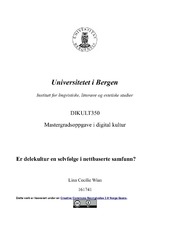Er delekultur en selvfølge i nettbasert samfunn?
Master thesis
Permanent lenke
https://hdl.handle.net/1956/6302Utgivelsesdato
2012-11-20Metadata
Vis full innførselSamlinger
Sammendrag
Utviklingen av teknologi slik som internett har gjort det enkelt å møte mennesker, hjemmefra eller fra jobb. Internett gir oss mulighet til å danne felleskap med mennesker vi ikke kjenner fra før av. Denne oppgaven ser på nettstedet Del og bruk for å se om en kultur for deling er en selvfølge, om mange brukere er det samme som mange bidragsytere og om nettstedet er vellykket i å nå sitt eget mål. Oppgaven sammenligner nettstedet Del og Bruk med felleskapet rundt Fri og åpen programvare. The development of web-technologies has made it very easy to meet with people we don't even know from our homes and workplaces. The web allows us to create online communities, where we can share and collaborate to solve tasks or to develop our own knowledge. Technology matters in our everyday life, and technologies related to information communication (ICT) is become a significant part of the Norwegian school system. The ICT is suppose to grant the users a better everyday. This paper takes a look at the online community Del og Bruk, a community designed for teachers to meet and collaborate to increase their own knowledge of teaching with ICT. The paper investigates whether the community is healthy and manages to resolve the task given it self. It also looks at the relation between members and contributions, do plenty of members mean plenty of content? This is connected with sharing, a cultural trait of online communities such as Del og Bruk. Culture for sharing is a significant part of an much older and more developed community, the Free and Open Source Software community (FOSS). The FOSS-community is no longer only about software. From that community the idea of sharing as a cultural value has grown into several other shapes such as Wikipedia and Creative Commons. It looks like the online communities has sharing culture as a natural consequence of its platform -the web. Compared with this, communities such as Del og Bruk, should also be a sharing community.
